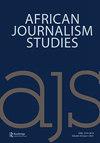The Rise of Peripheral Actors in Media Regulation in South Africa: An Entry of Social Media Mob(s)
IF 1.8
3区 文学
Q3 COMMUNICATION
引用次数: 2
Abstract
ABSTRACT This article discusses the nature of social media mobs as an informal regulation of journalism by exploring selected cases. To a limited degree, social media mobs are already in practice without standardisation and compliance. It is therefore essential to study and theorise about the informal regulation of journalism by social media mobs than to dismiss them as useless trolls. This paper is theoretically grounded by media accountability systems and the fifth estate. The paper discusses the practical applications of the fifth estate in the informal regulation of journalism by describing mobbing cultures towards journalists such as trolling, digital vigilantism, cybermob censorship and social media mobs as the fifth estate and media accountability systems in practice. Astroturfing is presented as a challenge to these initiatives. The article zones in on social media mobs and presents four South African case studies. It was found that social media mobs are not always a unitary mass; they are as divided as the public interests that mobilise them. Four journalistic transgression categories that social media mobs respond to are (a) the quality of journalism, ethics and professional convention; (b) media independence and bias; (c) universal moralisation: hate speech, racism and classism; and (d) disinformation and fake news. These parameters are context- and time-bound.南非媒体监管中外围参与者的崛起:社交媒体暴徒的进入
摘要本文通过对选定案例的探讨,探讨了社交媒体暴民作为新闻业非正式监管的本质。在一定程度上,社交媒体暴民已经在实践中没有标准化和合规性。因此,研究和理论化社交媒体暴民对新闻业的非正式监管,而不是将他们视为无用的巨魔。本文的理论基础是媒体问责制度和第五产业。本文讨论了第五产业在新闻业非正式监管中的实际应用,将针对记者的暴民文化描述为第五产业,如巨魔、数字私刑、网络暴民审查和社交媒体暴民以及实践中的媒体问责制度。太空草皮被认为是对这些举措的挑战。这篇文章聚焦于社交媒体暴民,并介绍了四个南非案例研究。研究发现,社交媒体暴民并不总是一个单一的群体;他们和动员他们的公共利益一样存在分歧。社交媒体暴民回应的四类新闻违规行为是:(a)新闻质量、道德和职业惯例;(b) 媒体独立性和偏见;(c) 普遍道德化:仇恨言论、种族主义和阶级主义;以及(d)虚假信息和假新闻。这些参数有上下文和时间限制。
本文章由计算机程序翻译,如有差异,请以英文原文为准。
求助全文
约1分钟内获得全文
求助全文
来源期刊

African Journalism Studies
COMMUNICATION-
CiteScore
1.90
自引率
10.00%
发文量
18
期刊介绍:
Accredited by the South African Department of Higher Education and Training for university research purposes African Journalism Studies subscribes to the Code of Best Practice for Peer Reviewed Scholarly Journals of the Academy of Science of South Africa. African Journalism Studies ( AJS) aims to contribute to the ongoing extension of the theories, methodologies and empirical data to under-researched areas of knowledge production, through its emphasis on African journalism studies within a broader, comparative perspective of the Global South. AJS strives for theoretical diversity and methodological inclusivity, by developing theoretical approaches and making critical interventions in global scholarly debates. The journal''s comparative and interdisciplinary approach is informed by the related fields of cultural and media studies, communication studies, African studies, politics, and sociology. The field of journalism studies is understood broadly, as including the practices, norms, value systems, frameworks of representation, audiences, platforms, industries, theories and power relations that relate to the production, consumption and study of journalism. A wide definition of journalism is used, which extends beyond news and current affairs to include digital and social media, documentary film and narrative non-fiction.
 求助内容:
求助内容: 应助结果提醒方式:
应助结果提醒方式:


